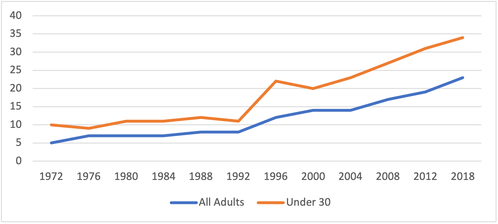None The Wiser
Type your new text here.

There’s an old saying you’ve probably heard that goes, “I’m none the wiser.” In other words, something has happened and yet I know no more, have gained no more wisdom, than before it happened.
When I was college age, way back in the early 1970’s, the number of adult people who claimed no religious affiliation, who marked “none” on the question about religious affiliation, was 5% of the population. So, one out of twenty people floated in this no-man’s land of religion. At the same time, for those under the age of 30, it was about 10%, so one out of 10. Those statistics did not change much through the next 20 years but starting about 1994 it would skyrocket.
From 1994 until now there has been a very consistent incline in the percentage claiming to have no religious affiliation. In 2018 (the most recent available numbers) 23% of all adults made this claim, or almost one out of four. And 34% of those under age 30 said “none” when asked about religion. Below is a chart that plots the progression during the last almost 50 years.
When I was college age, way back in the early 1970’s, the number of adult people who claimed no religious affiliation, who marked “none” on the question about religious affiliation, was 5% of the population. So, one out of twenty people floated in this no-man’s land of religion. At the same time, for those under the age of 30, it was about 10%, so one out of 10. Those statistics did not change much through the next 20 years but starting about 1994 it would skyrocket.
From 1994 until now there has been a very consistent incline in the percentage claiming to have no religious affiliation. In 2018 (the most recent available numbers) 23% of all adults made this claim, or almost one out of four. And 34% of those under age 30 said “none” when asked about religion. Below is a chart that plots the progression during the last almost 50 years.

What has driven this, especially over the past 25 years that has seen such a drastic increase? I’m sure we could all offer factors. The impact of television and movies (Hollywood, so to speak), the takeover in many public schools of a very anti-religious group of teachers and administrators, the breakdown of the family with the high rise of divorces impacting children in particular, the advent of social media and the avalanche of junk thrown at us, and possibly topping the list might be the large number of “Christians” who pay little attention to the Bible, who attend church sporadically, and whose children see the faith the parents claim having no real impact in the way they live. Such people say they follow Christ, but when it comes to what Jesus and his apostles teach in the Bible, a major disconnect is found. So, they accept homosexuality as an acceptable lifestyle, they may have little problem with considering an abortion after a pregnancy due to sexual permissiveness, etc., etc. The morals of the Bible are hidden away while the values of the culture surround them and they slowly (not so slowly) seep in & take over.
What can be done? Within the church we need to emphasize discipleship. Faith that is only mental assent is not the faith Christ calls for. If we call him Lord, we must do what he says (Luke 6:46). This doesn’t negate grace, but it verifies that our faith is real and that we actually are following our Lord. You are the only person who can control that for yourself, and you can set the example for your kids.
What can be done? Within the church we need to emphasize discipleship. Faith that is only mental assent is not the faith Christ calls for. If we call him Lord, we must do what he says (Luke 6:46). This doesn’t negate grace, but it verifies that our faith is real and that we actually are following our Lord. You are the only person who can control that for yourself, and you can set the example for your kids.
